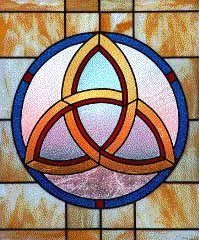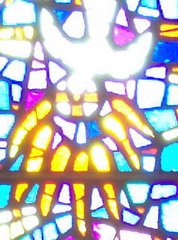Table of Contents (from New Advent)
Augustine provides a summary of the work in the final book (Book XV, Chapter 3):
In the first book, the unity and equality of that highest Trinity is shown from Holy Scripture.
In the second, third, and fourth, the same: but a careful handling of the question respecting the sending of the Son and of the Holy Spirit has resulted in three books; and we have demonstrated, that He who is sent is not therefore less than He who sends because the one sent, the other was sent; since the Trinity, which is in all things equal, being also equally in its own nature unchangeable, and invisible, and everywhere present, works indivisibly.
In the fifth,—with a view to those who think that the substance of the Father and of the Son is therefore not the same, because they suppose everything that is predicated of God to be predicated according to substance, and therefore contend that to beget and to be begotten, or to be begotten and unbegotten, as being diverse, are diverse substances,—it is demonstrated that not everything that is predicated of God is predicated according to substance, as He is called good and great according to substance, or anything else that is predicated of Him in respect to Himself, but that some things also are predicated relatively, i.e. not in respect to Himself, but in respect to something which is not Himself; as He is called the Father in respect to the Son, or the Lord in respect to the creature that serves Him; and that here, if anything thus relatively predicated, i.e. predicated in respect to something that is not Himself, is predicated also as in time, as, e.g., "Lord, You have become our refuge," then nothing happens to Him so as to work a change in Him, but He Himself continues altogether unchangeable in His own nature or essence.
In the sixth, the question how Christ is called by the mouth of the apostle "the power of God and the wisdom of God," is so far argued that the more careful handling of that question is deferred, viz. whether He from whom Christ is begotten is not wisdom Himself, but only the father of His own wisdom, or whether wisdom begat wisdom. But be it which it may, the equality of the Trinity became apparent in this book also, and that God was not triple, but a Trinity; and that the Father and the Son are not, as it were, a double as opposed to the single Holy Spirit: for therein three are not anything more than one. We considered, too, how to understand the words of Bishop Hilary, "Eternity in the Father, form in the Image, use in the Gift."
In the seventh, the question is explained which had been deferred: in what way that God who begat the Son is not only Father of His own power and wisdom, but is Himself also power and wisdom; so, too, the Holy Spirit; and yet that they are not three powers or three wisdoms, but one power and one wisdom, as one God and one essence. It was next inquired, in what way they are called one essence, three persons, or by some Greeks one essence, three substances; and we found that the words were so used through the needs of speech, that there might be one term by which to answer, when it is asked what the three are, whom we truly confess to be three, viz. Father, and Son, and Holy Spirit.
In the eighth, it is made plain by reason also to those who understand, that not only the Father is not greater than the Son in the substance of truth, but that both together are not anything greater than the Holy Spirit alone, nor that any two at all in the same Trinity are anything greater than one, nor all three together anything greater than each severally. Next, I have pointed out, that by means of the truth, which is beheld by the understanding, and by means of the highest good, from which is all good, and by means of the righteousness for which a righteous mind is loved even by a mind not yet righteous, we might understand, so far as it is possible to understand, that not only incorporeal but also unchangeable nature which is God; and by means, too, of love, which in the Holy Scriptures is called God, by which, first of all, those who have understanding begin also, however feebly, to discern the Trinity, to wit, one that loves, and that which is loved, and love.
In the ninth, the argument advances as far as to the image of God, viz. man in respect to his mind; and in this we found a kind of trinity, i.e. the mind, and the knowledge whereby the mind knows itself, and the love whereby it loves both itself and its knowledge of itself; and these three are shown to be mutually equal, and of one essence.
In the tenth, the same subject is more carefully and subtly handled, and is brought to this point, that we found in the mind a still more manifest trinity of the mind, viz. in memory, and understanding, and will. But since it turned out also, that the mind could never be in such a case as not to remember, understand, and love itself, although it did not always think of itself; but that when it did think of itself, it did not in the same act of thought distinguish itself from things corporeal; the argument respecting the Trinity, of which this is an image, was deferred, in order to find a trinity also in the things themselves that are seen with the body, and to exercise the reader's attention more distinctly in that.
Accordingly, in the eleventh, we chose the sense of sight, wherein that which should have been there found to hold good might be recognized also in the other four bodily senses, although not expressly mentioned; and so a trinity of the outer man first showed itself in those things which are discerned from without, to wit, from the bodily object which is seen, and from the form which is thence impressed upon the eye of the beholder, and from the purpose of the will combining the two. But these three things, as was patent, were not mutually equal and of one substance. Next, we found yet another trinity in the mind itself, introduced into it, as it were, by the things perceived from without; wherein the same three things, as it appeared, were of one substance: the image of the bodily object which is in the memory, and the form thence impressed when the mind's eye of the thinker is turned to it, and the purpose of the will combining the two. But we found this trinity to pertain to the outer man, on this account, that it was introduced into the mind from bodily objects which are perceived from without.
In the twelfth, we thought good to distinguish wisdom from knowledge, and to seek first, as being the lower of the two, a kind of appropriate and special trinity in that which is specially called knowledge; but that although we have got now in this to something pertaining to the inner man, yet it is not yet to be either called or thought an image of God.
And this is discussed in the thirteenth book by the commendation of Christian faith.
In the fourteenth we discuss the true wisdom of man, viz. that which is granted him by God's gift in the partaking of that very God Himself, which is distinct from knowledge; and the discussion reached this point, that a trinity is discovered in the image of God, which is man in respect to his mind, which mind is "renewed in the knowledge" of God, "after the image of Him that created" man; "after His own image;" and so obtains wisdom, wherein is the contemplation of things eternal.
Definition
perichoresis: circuition, going around, or more precisely envelopment -- being drawn into the circulation of divine love and participating in the coinherence of the Divine Persons.
John 17:20-23.26: "I pray not only for them, but also for those who will believe in me through their word, so that they may all be one, as you, Father, are in me and I in you, that they also may be in us, that the world may believe that you sent me. And I have given them the glory you gave me, so that they may be one, as we are one, I in them and you in me, that they may be brought to perfection as one, that the world may know that you sent me, and that you loved them even as you loved me... that the love with which you loved me may be in them and I in them."

St. Alexander of Alexandria
"They hanged upon a tree Him Who stretches out the earth; they transfixed Him with nails Who laid firm the foundation of the world; they circumscribed Him Who circumscribed the heavens; they bound Him Who frees sinners."
Blog Archive
-
▼
2007
(16)
-
▼
June
(16)
- Martin Luther
- Considering Richard of St. Victor
- Augustine's "On The Trinity"
- John Calvin from "The Institutes of the Christian ...
- The Self-Giving Triune God, The Imago Dei And The ...
- The Living Breath of God
- Jonathan Edwards
- The Divine Dance - Exploring the Mystery of the Tr...
- Triune God Chart
- Claims of Jesus
- Jesus in the Old Testament
- The Names of God
- Early Trinitarian Quotes
- Dante's Final Vision
- Preliminary Articles
- Idols of the Mind
-
▼
June
(16)
Devotional Reading

